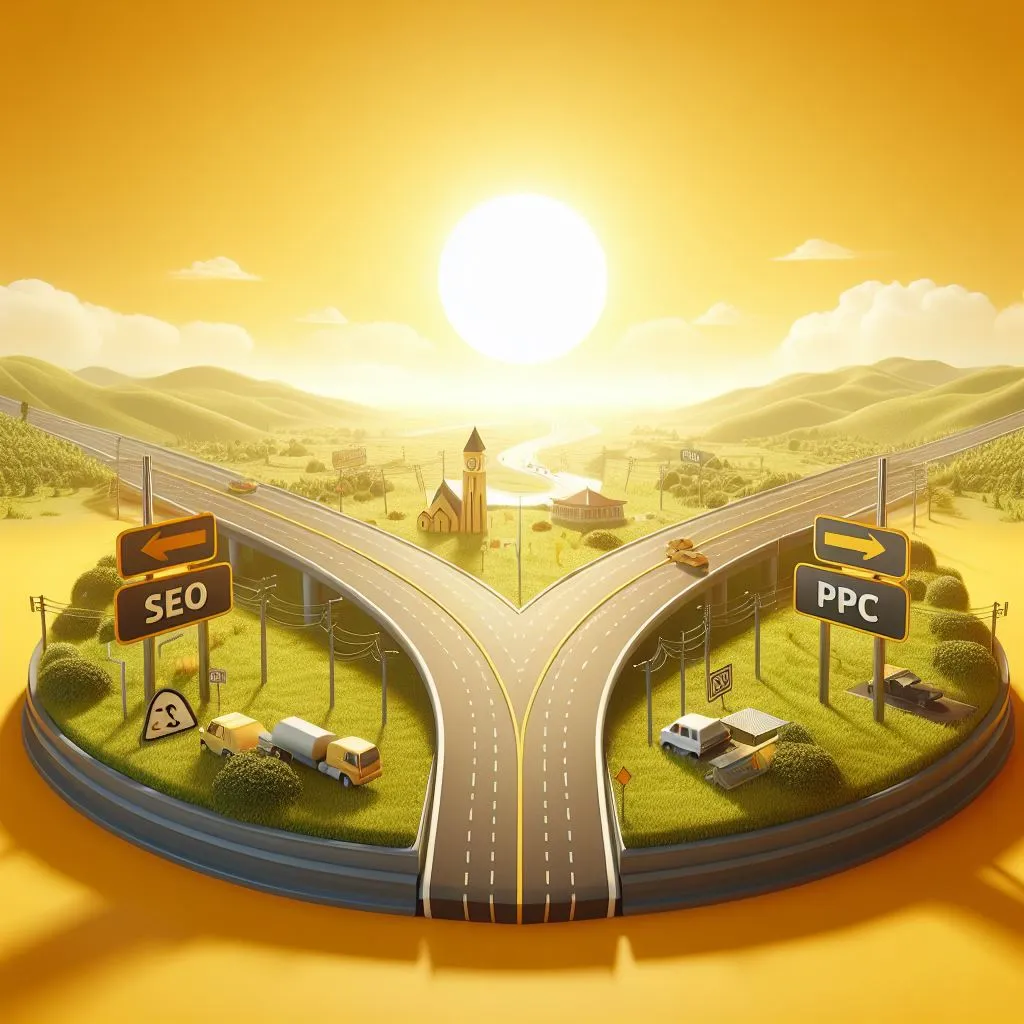
We often need clarification on this dilemma at our digital marketing agency confusion between SEO and PPC. Some even mistake them for being the same. That’s why we have taken the initiative to provide clarity on this topic. In this blog, we’ll explain the differences between SEO and PPC and help you determine which one aligns best with your business goals.
By the end of this blog, you will clearly understand which strategy – or perhaps both – will elevate your business in the search engine rankings and attract those sought-after customers.
Table of contents
- What is SEO?
- Pros and Cons of SEO
- What is PPC?
- Pros and Cons of PPC
- Difference between Pay Per Click (PPC) vs Search Engine Optimisation (SEO)
- SEO or PPC: What Should You Choose For Your Business
- Second Option: SEO & PPC Both
- Conclusion
- Frequently Asked Questions
What is SEO?
SEO (Search Engine Optimisation) is all about making your website more attractive to search engines like Google, Yahoo and Bing. The better your SEO, the higher your website ranks in organic search results (the unpaid listings that show up when someone types something in).
SEO is a long-term investment that can pay off big time. Once you have optimised your website for relevant keywords and user experience, you can reap the rewards of free, organic traffic for months, even years, to come.
But SEO isn’t magic. It takes time, effort, and a sprinkle of strategic planning to climb the search engine ranks. An SEO agency can be a great resource for businesses that don’t have the time or expertise to tackle SEO themselves (especially an SEO company if you are local!).
Pros and Cons of SEO
Pros
1. It is cost-effective
The cost-effectiveness of SEO is its greatest advantage. You won’t have to pay for each click after your website has been optimised for search engines. Because of this, SEO is an excellent choice for companies on a limited budget. Buying SEO tools or working with an SEO service may have upfront expenses, but overall, the advantages exceed the expenditures.
2. Gives you long-term benefits
While it takes time and effort to climb the search engine rankings, the rewards are long-lasting. A well-optimised website can continue to attract organic traffic for months, even years, to come. This consistent stream of visitors can translate to increased brand awareness, leads and sales.
Cons
1. It takes time
Unlike PPC, which can deliver results almost instantly, SEO is a slow and steady climb. It can take months, sometimes even a year, to see significant improvements in your website traffic and ranking.
2. It requires ongoing unique content
Search engines love fresh, informative content. To maintain a good SEO ranking, you will need to be prepared to consistently create unique and valuable content for your website. This could include blog posts, articles, infographics, or even videos.
3. Some keywords can be hard to compete
Certain keywords, especially those in highly competitive industries, can be incredibly challenging to rank for. In these cases, it’s important to target long-tail keywords (more specific keyword phrases) that are less competitive but still relevant to your target audience.
What is PPC?
Now, let’s say you need a quicker way to get your website noticed. That’s where
With PPC, you create targeted ads that appear at the top of search engine results pages (SERPs) or on other websites. You only pay when someone clicks on your ad, hence the name “pay-per-click.”
PPC is fantastic for generating immediate traffic and brand awareness. Need to promote a special offer or a new product launch? PPC can spread the word out there lightning-fast.
However, PPC isn’t a free ride. You will need to set a budget and bid on keywords that are relevant to your business. The more competitive the keyword, the more you will pay each time someone clicks on your ad.
Managing a successful PPC campaign requires a strategic mind and constant monitoring. Digital marketing companies specialise in this (including a digital marketing company if you are looking for local expertise). They can help you create targeted ads, manage your budget and track your results to ensure you are getting the most ROI.
Pros and Cons of PPC
Pros
1. Targeted advertising
PPC allows you to target a very specific audience with your advertising efforts. You can make sure that individuals who are interested in your products or services are seeing your ads by selecting demographics and keywords that are relevant to them. Your click-through rate (CTR) and conversion rate can be greatly increased with this focused approach, which will increase the return on investment (ROI) of your advertising expenditure.
2. Quick results
PPC delivers results almost instantly. Once you have launched your PPC campaign, you can start seeing website traffic and potential leads within a matter of hours. This makes PPC a valuable tool for businesses that need a quick influx of traffic or want to promote time-sensitive offers
3. Measurable results
With PPC, you have complete control over your budget and can track the performance of your campaigns in real time. You can see how many people see your ads, how many clicks they generate, and how much each click costs. This data allows you to fine-tune your campaigns for maximum efficiency and ensure you are getting the most bang for your buck
Cons
1. Costly
PPC can be an expensive undertaking, especially if you are targeting competitive keywords.The cost per click can vary depending on the keyword, your industry, and the platform you are using. It’s important to set a realistic budget for your PPC campaigns and be prepared to adjust your strategy based on your results.
2. Ongoing investment
Unlike SEO, which provides long-term benefits, PPC requires a continuous investment to maintain results. Once you stop paying for clicks, your ads will no longer be displayed. This means you will need to consistently monitor your campaigns and allocate a budget to keep them running effectively.
3. It can lose effectiveness
As users become more accustomed to seeing PPC ads, they may become less likely to click on them. To combat this, it’s crucial to constantly update your ad copy and target audiences to ensure your campaigns remain fresh and effective. Additionally, some platforms may adjust their algorithms over time, impacting the visibility and cost of your ads
Difference between Pay-per-click (PPC) vs Search Engine Optimisation (SEO)
Now that you have understood the basics of SEO and PPC, it’s time for the main event: the difference between SEO and PPC. Here’s a quick breakdown:
| Criteria | Pay-per-click (PPC) | Search engine optimisation (SEO) |
|---|---|---|
| Cost | Pay per click | Free (after initial optimisation) |
| Results | Fast (almost instant) | Long-term (months to years) |
| Control | High control over ad targeting and placement | Limited control over ranking position |
| Traffic source | Paid traffic from users clicking on ads | Organic traffic from users actively searching for relevant content. |
| Sustainability | Immediate results, but traffic stops when the advertising budget is exhausted. | Effects are long-lasting but may require ongoing adjustments. |
| Competitiveness | Competitive, with ad placement influenced by bidding and ad quality. | Competitive, with rankings influenced by various factors. |
| Strategy | Strategic attention to the bidding approach, ad wording, and keyword selection. | Strategic emphasis on website structure, backlinks, and content |
| Best for | Targeted campaigns, immediate brand awareness, promoting special offers | Long term brand building and sustainable traffic growth |
SEO or PPC: What Should You Choose For Your Business
So, which contender should you choose? Here’s a fighting tip: it depends on your business goals and budget.
Opt for SEO if:
- 🔍 You seek a consistent, long-term traffic solution.
- 🔍 Your goal is branding
- 🔍 You are ready to commit time and resources to SEO optimisation.
- 🔍 Gradual traffic growth aligns with your strategy and you have a long-term growth strategy for your brand..
Go for PPC if:
- 💥 Immediate results are non-negotiable; you need traffic now.
- 💥 Your goal is to attract and generate maximum leads.
- 💥 You have earmarked a specific advertising budget.
- 💥 Precisely targeting your audience is your priority for quick wins.
Second Option: SEO & PPC Both
But wait, there is more! SEO and PPC can be a match made in marketing heaven. Here’s why:
PPC research can inform your SEO
Running PPC campaigns can help you identify relevant keywords and phrases that people are actually searching for. You can then use this information to optimise your website content for those keywords, improving your SEO ranking in the long run.
SEO builds brand trust
A high organic ranking shows search engines (and potential customers) that you are a credible source. This trust factor can then benefit your PPC campaigns, as people are more likely to click on ads from a trusted brand.
PPC complements slow SEO growth
While SEO takes time to show results, PPC can fill the gap by driving immediate traffic to your website. This can be especially helpful for new businesses or those launching new products or services.
Conclusion
So, SEO or PPC? The truth is, there is no single champion in this digital marketing showdown. It’s more like a tag team match, where both SEO and PPC work together to deliver a knockout punch to your online visibility.
SEO helps you build brand authority and attract consistent organic traffic over time. PPC delivers immediate results and targeted advertising to capture that quick influx of website visitors. Ready to utilise the power of SEO and PPC in your business? We can help! At Flora Fountain, we offer a comprehensive range of digital marketing services, including both SEO and PPC campaign management. Contact us today for a free consultation and discover how we can craft a winning digital marketing strategy tailored to your specific business goals!



